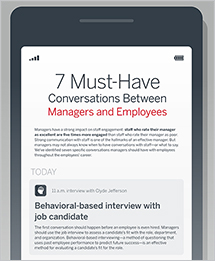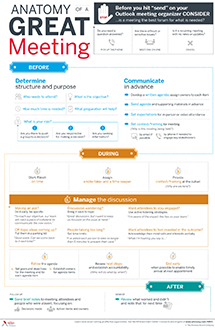Auto logout in seconds.
Continue Logout
When people complain about meetings, they often raise big-picture concerns: "We have too many. They're a waste of time. Nothing gets done," writes Paul Axtell, a speaker and author with about 25 years' experience consulting with organizations on effective meetings, for the Harvard Business Review.
The science—and strategy—behind having a 'great meeting'
Such criticisms, Axtell writes are "difficult to argue with and harder to address." But over the years, Axtell writes he's identified five very common complaints that actually have "specific solutions":
1. "One or two people dominate the conversation, and no one does anything about it."
When a few vocal participants dominate a meeting, their colleagues often feel like they can't get a word in edgewise. To address the problem, Axtell recommends opening the meeting by:
- Telling the group "you want broad participation" and encouraging everyone to contribute;
- Calling on individual people during the meeting to get different perspectives on a topic;
- Letting the group know you will not move on from a topic if anyone has anything left to say or ask; and
- Asking the group to "set aside technology" and other work to stay focused and ready to contribute.
During the meeting, if you sense that someone is speaking too frequently, Axtell recommends asking that person to hold their thoughts, at least for a moment.
If someone gets interrupted, Axtell writes, the meeting organizer should always double back to let them finish their thoughts. (And if you're the person who gets interrupted, speak up about it!)
2. "My boss doesn't lead meetings effectively."
If the person who usually leads your meetings isn't doing so effectively, Axtell writes that you can step up and volunteer to prepare the agenda.
If you have the respect of your group, you can even volunteer to lead the meeting yourself, Axtell writes. If you're not the right person to lead the meeting, suggest someone else while "explaining to your boss that just because they're the most senior person in the room doesn't mean they have to run the meeting."
3. "Most of our meetings are just passing along information that could easily be sent in an email. We don't talk about real issues."
It's perfectly fine to spend 10 to 15 minutes of a 90-minute meeting on updates, Axtell writes, but when the whole meeting is spent on information that could be communicated in a different format, there's a problem.
To remedy this, Axtell recommends crafting an agenda and identifying potential topics that determine:
- What the team needs to talk about;
- What the vital initiatives are;
- What the team needs to learn;
- What the team needs to develop a mutual understanding about; and
- What things people are losing sleep over.
Axtell also recommends identifying the desired outcomes for each topic and how long it will take to achieve them.
4. "No one is paying attention because they're on their phones or laptops."
While the occasional phone ring is tolerable, people regularly checking emails or texts or doing other work during a meeting can be extremely distracting, Axtell writes. The solution has to come from the top down: If the senior people in a meeting "have side conversations, bring other work, or constantly check their technology, they're sending the message that this meeting doesn't really matter to them," Axtell writes.
Axtell recommends reaching an agreement to limit technology use during meetings. If that task seems too daunting, Axtell recommends just setting the example yourself. "You'll be surprised at how quickly colleagues will notice that you are completely present and that others are not," he writes. "And they just might join you."
5. "We keep having the same conversations because nothing gets done between meetings."
If it seems like the problems raised in meetings remain unaddressed, make sure that you assign action steps after a meeting, Axtell writes. He recommends sending out a summary of the meeting within an hour of its end and assigning someone to follow up with your team members between meetings.
Axtell also recommends keeping track of how many items discussed in meetings are completed, with a goal of an 85% completion rate. If that rate starts to slip, Axtell writes you should have a conversation with your team about how to get back on track (Axtell, Harvard Business Review, 6/4).
Next, get 10 more tactics to stop wasting time—and have productive meetings
There are about 11 million formal meetings in the United States every day—and more than half of them may be unproductive. Why? Because many meetings are inefficiently run. They don't set or achieve clear goals. And we hold them out of habit.
Drawing on best practices—as well as lessons from across our own organization—we've created this useful infographic to guide if you really need a meeting (and if so, how to maximize everyone's time).
Don't miss out on the latest Advisory Board insights
Create your free account to access 1 resource, including the latest research and webinars.
Want access without creating an account?
You have 1 free members-only resource remaining this month.
1 free members-only resources remaining
1 free members-only resources remaining
You've reached your limit of free insights
Become a member to access all of Advisory Board's resources, events, and experts
Never miss out on the latest innovative health care content tailored to you.
Benefits include:
You've reached your limit of free insights
Become a member to access all of Advisory Board's resources, events, and experts
Never miss out on the latest innovative health care content tailored to you.
Benefits include:
This content is available through your Curated Research partnership with Advisory Board. Click on ‘view this resource’ to read the full piece
Email ask@advisory.com to learn more
Click on ‘Become a Member’ to learn about the benefits of a Full-Access partnership with Advisory Board
Never miss out on the latest innovative health care content tailored to you.
Benefits Include:
This is for members only. Learn more.
Click on ‘Become a Member’ to learn about the benefits of a Full-Access partnership with Advisory Board
Never miss out on the latest innovative health care content tailored to you.


